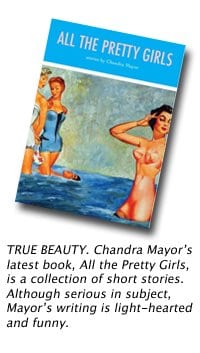Single moms on welfare who fall into relationships with other women aren’t the types of characters who make it into most Canadian literature, but they’re becoming Chandra Mayor’s muses.
The 34-year-old, Winnipeg-based writer has just published her first book of short stories, All the Pretty Girls, about women who find companionship and love while struggling through poverty and marginalization. Recently, it won a thumbs-up from the Globe and Mail’s influential Books section, just as Mayor’s first novel, Cherry (released four years ago) got a rave review from the Toronto Star. Cherry, which tackled the same themes as All the Pretty Girls, won the Carol Shields Winnipeg Book Award in 2005.
Ironically, it was Mayor’s experience at a Carol Shields tribute event that first prompted her to write about the kind of women who don’t mingle in the middle-class world portrayed in books like Shields’ The Stone Diaries. “Someone got up and said, ‘The amazing thing about Carol Shields is that she writes about normal, everyday people,'” Mayor recounts. “And I thought, holy Christ, if she writes about normal, everyday people, what does that make me?”
While Cherry is set in Winnipeg’s rough, racist skinhead scene of the 1990s, the stories in All the Pretty Girls take place in the present day. The central characters include an abused woman who shares her pain with another woman online; a woman who is reunited with the lover who abandoned her ten years earlier; and a group of women who lean on each other for support at a funeral. The subject matter in Mayor’s work is serious, but her writing is often light-hearted and funny, and her stories have universal appeal. Mayor’s description of Winnipeg, for instance, can be appreciated by anyone who chooses (or is forced by circumstances) to remain in their hometown.
“It’s a pretty tough city to try anonymity in. Doesn’t matter what’s going on in your life; the second you walk out the door, feeling good about yourself, you’re pretty much guaranteed to run into someone who remembers your excruciatingly bad perm, circa 1989. Or the time you were trying to pee at a bush party and fell into the fire. No secrets, about your past, your present, or even your future.”
Mayor’s work is fiction, but her life story mirrors those of the women she writes about. She’s raising a teenaged daughter on the modest income she earns from artists’ grants and royalties, while working part-time in a used bookstore. Plus, she’s a lesbian. But even though some of the women in Cherry and All the Pretty Girls are also gay, they don’t necessarily identify that way. “A couple of characters are explicitly queer,” says Mayor. “Others understand themselves to be explicitly straight and yet the kind of connections they’re looking for are from queer connections. And others are sort of somewhere in between, floating back and forth.”
She adds: “I don’t like to write with a political agenda so I didn’t want to make all my characters lesbians nor all my characters straight because I think in reality it is much more fluid than that, especially for young women who are trying to figure stuff out.”
Mayor knows she’s never going to strike it rich as a writer as long as she spins stories about women on welfare. For her, success comes when she reads e-mails from readers who thank her for shining a spotlight on women who work hard and raise kids and love each other, but don’t necessarily make it above the poverty line — or want to.
“Maybe the middle-class dream isn’t really my dream,” says Mayor. “Maybe my dream is something else. But it’s hard to believe that, because every force in the world tells you that’s wrong and stupid and not good enough and that you should be ashamed and silent.”
When women are ashamed and silent, they won’t write about their unique life experiences. And that’s why Mayor feels compelled to keep doing it for them.

 Why you can trust Xtra
Why you can trust Xtra


